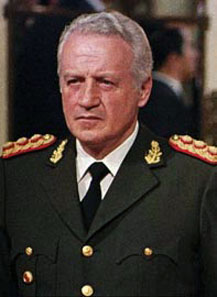- Leopoldo Galtieri
Infobox_President | name=Leopoldo Galtieri

nationality=Argentine
order= 45thPresident of Argentina
term_start=December 22 1981
term_end=June 17 1982
predecessor=Roberto Viola
successor=Reynaldo Bignone
birth_date=birth date|1926|7|15|mf=y
birth_place=Buenos Aires
death_date=death date and age|2003|01|12|1926|07|15
death_place=Buenos Aires
spouse=
party=
vicepresident=
profession=Military Leopoldo Fortunato Galtieri Castelli (
July 15 ,1926 -January 12 ,2003 ) was an Argentine general andPresident of Argentina from22 December 1981 to18 June 1982 , during the last military dictatorship. The death squadIntelligence Battalion 601 directly reported to him. [ [http://www.gwu.edu/~nsarchiv/NSAEBB/NSAEBB73/index.htm New Documents Describe Key Death Squad Under Former Army Chief Galtieri] ,National Security Archive ]Early life
Galtieri was the child of working class parents who were themselves children of poor Italian immigrants. At 17 he enrolled in the Argentine military academy to study
civil engineering , and his early military career was as an officer in the engineering branch.Rise to power
In 1975, after more than 25 years as a combat engineer, he became commander of the Argentine engineering corps. He was an enthusiastic supporter of the military coup that started the self-styled National Reorganisation Process in 1976 and rose further, becoming a major general in 1977 and commander-in-chief in 1980 with the rank of lieutenant general.
During the junta's rule, Congress was suspended, unions, political parties and provincial governments were banned, and in what became known as the "
Dirty War " between 9,000 and 30,000 people deemed left-wing "subversives"disappeared from society.Torture and mass executions were both commonplace. The economy, which had been in dire condition prior to the coup, recovered for a short time, then deteriorated further.In early 1981 Galtieri visited the
United States and was warmly received, as the Reagan administration viewed his regime as abulwark againstCommunism . National Security AdvisorRichard V. Allen described him as a "majestic general". Galtieri's strength was sufficient to allow him to remove a number of rival generals and, in December 1981, he rose to the presidency of Argentina by means of a coup that ousted interim PresidentRoberto Viola .Galtieri retained direct control of the army and did not appoint a new commander-in-chief. He attempted to repair the economy by slashing spending, selling off remaining government-owned industries, squeezing money supply and freezing salaries. He instituted limited political reforms which allowed the expression of dissent, and anti-junta demonstrations soon became common, as did agitation for a return to democracy.
Falklands War
After Galtieri had been in office for four months and with his popularity low, Argentine forces invaded the lightly-defended British
Falkland Islands in April 1982 and declared them a province of Argentina. theUnited Kingdom ,United Nations , and many other countries around the world condemned the annexation (the US eventually joined the chorus after initially equivocating), yet in Argentina the invasion was wildly popular. The anti-junta demonstrations were replaced by patriotic demonstrations in support of Galtieri. In the morning of April 2, 1982, the first day of the invasion, a small group of people gathered in the historic Plaza de Mayo, across from the Casa Rosada, the government site. After a while Galtieri showed up on one of the balconies (not the same used by Perón but one located to the left of it) and raised his hands to cheer the small group of supporters. A few minutes later a siren was heard and many bystanders started to flee in panic, reminiscent of the tough repression that happened just a few days before in the same place, on March 30th.Galtieri and many observers thought that, in the post World War II era, the armed forces of the
United Kingdom no longer had the resources necessary to contest the invasion. However, after diplomatic pressure and negotiations led nowhere, the UK government, led byPrime Minister Margaret Thatcher , decided to re-take the islands and deployed naval task forces to do so. TheFalklands War was over within two months. Superior training, highly professional armed forces and technology, including some of the most advanced weapons systems to date, made up for the numerical and geographic advantages of Argentina.Defeat, fall from power, trial and prison
Stanley was retaken by the British forces in June 1982 and within days General Galtieri was removed from power. He spent the next 18 months at a well-protected country retreat while democracy was restored to Argentina. Along with other members of the former junta, he was arrested in late 1983 and charged in a military court with human rights violations during the Dirty War, and with mismanagement of the
Falklands War .He was cleared of the civil rights charges in December 1985 but (together with the Air Force and Navy commanders-in-chief) found guilty of mishandling the war in May 1986 and sentenced to prison. All three appealed (this time in a civil court) while the prosecution appealed for heavier sentences. In November 1988 the original sentences were confirmed and all three commanders were stripped of their rank. Galtieri served five years in prison before receiving President
Carlos Menem 'spardon in 1991.Later life, further accusations, and death
In July 2002 new civil charges were brought concerning the kidnapping of children and disappearance of 18 leftist sympathizers in the late 1970s (while Galtieri was commander of the Second Army Corps), and the disappearance or death of three Spanish citizens at about the same time. Galtieri was placed under house-arrest. With his health declining, he was admitted to a hospital in Buenos Aires to be treated for
cancer of thepancreas . He died there of a heart attack at the age of 76.References
Wikimedia Foundation. 2010.
